Coordinación
Una coordinación sólida puede evitar vacíos y duplicaciones en las respuestas humanitarias, así como garantizar que los PTM complementen otros tipos de asistencia. Sin embargo, el informe del «Estado Global de los Programas de Transferencias Monetarias» de la CALP Network muestra que la coordinación de la asistencia en efectivo es vista como débil y ad hoc, y que esto está teniendo graves repercusiones operativas.
Los donantes, las ONG y los líderes de los grupos de trabajo de transferencias monetarias (GTM) han pedido claridad sobre tres temas principales relacionados con la coordinación de la asistencia en efectivo:
- Quién debe ser responsable de asegurar una coordinación eficaz de la asistencia en efectivo;
- Cuál es la función y el mandato de los grupos de trabajo de transferencias monetarias, incluso en relación con las transferencias monetarias multipropósito;
- Cómo se debe dotar de recursos a la coordinación de asistencia en efectivo.
Tenemos que basarnos urgentemente en lo que funciona y proporcionar claridad a nivel mundial sobre las preguntas arriba mencionadas, adaptándonos a los diferentes contextos. Hace mucho tiempo que se deberían haber tomado decisiones claras basadas en necesidades operativas y no en la política de las agencias.
Prioridades actuales
El objetivo de la CALP Network es contribuir a seguir progresando en este tema en tres niveles: apoyar a los grupos de trabajo de transferencias monetarias a nivel regional; contribuir a soluciones prácticas para la coordinación de la asistencia en efectivo a nivel mundial; y convocar una discusión basada en la evidencia sobre temas clave, destacando puntos de decisión críticos y oportunidades de progreso.
Contenido destacado

Cash Coordination Tip Sheet
Guidelines and Tools
This tip sheet sets out established best practice, key guidance and resources for all aspects of cash coordination, intended as a clear, accessible and action-oriented guide for those engaged in coordination of cash and voucher assistance (CVA) at the field level.

Introducing the Cash Coordination Tip Sheet
Webinar
The CALP Network has developed a tipsheet setting out established best practice and key guidance and resources for all aspects of cash coordination, intended as a clear, accessible and action-oriented guide for those engaged in coordination of cash and voucher assistance at the field level.

Cash Coordination: A proposal from members in MENA
Blog Post
Earlier this year the CALP Network undertook regional consultations to explore options for cash coordination. This blog lays out recommendations from participants from the Middle East and North Africa who sketched out what cash coordination, and coordination more broadly, could look like in future to support a more effective, efficient and accountable response.
Últimos recursos
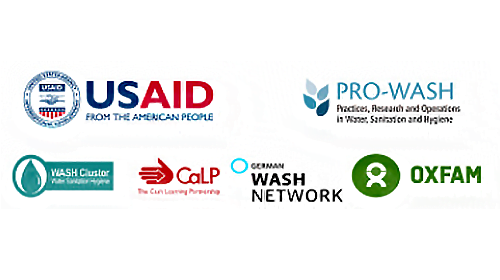
Market-Based Approaches for National WASH Cluster Response Plans: (In English and Spanish).
Members event
This webinar is aimed for humanitarian practitioners working in Ecuador, Venezuela, Columbia, Honduras and Haiti.
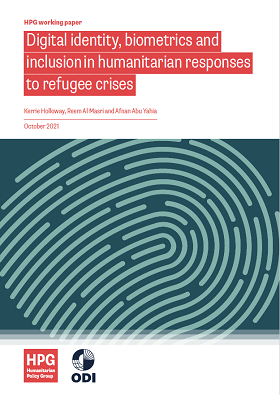
Digital identity, biometrics and inclusion in humanitarian responses to refugee crises
Report
Digital identity and biometrics have long been divisive topics in the humanitarian sector. On the one hand, they have the potential to be more inclusive and reach people in need at scale due to perceived efficiency gains. A legal identity for everyone as part of the Sustainable Development Goals (SDGs)...

Good Practice Review on Cash Assistance in Contexts of High Inflation and Depreciation: Case Study Yemen
Report
This case study accompanies CALP’s Good Practice Review on Cash Assistance in Contexts of High Inflation and Depreciation. It is intended to illustrate the process of situational analysis, response analysis and response option selection presented in the GPR. The learning from this case study has also...
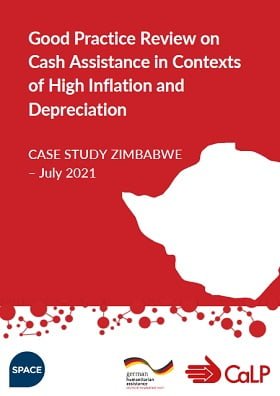
Good Practice Review on Cash Assistance in Contexts of High Inflation and Depreciation: Case Study Zimbabwe
Report
This case study accompanies CALP’s Good Practice Review on Cash Assistance in Contexts of High Inflation and Depreciation. It is intended to illustrate the process of situational analysis, response
analysis and response option selection presented in the GPR. The learning from this case study has also...

Good Practice Review on Cash Assistance in Contexts of High Inflation and Depreciation: Case Study Lebanon
Report
This case study accompanies CALP’s Good Practice Review on Cash Assistance in Contexts of High Inflation and Depreciation. It is intended to illustrate the process of situational analysis, response analysis and response option selection presented in the GPR. The learning from this case study has also...

5 Years of the Cash Workstream: Successes and Ways Forward
Members event
Looking back at 5 years of the cash workstream, and ways participants can continue to be involved in work going forward.

Cost-efficiency Analysis: Conditional cash for education and protection
Case Study
This case study summarizes an analysis conducted by CARE using the Dioptra tool to generate cost-efficiency estimates for Conditional Cash for Education and Protection in Jordan. The analysis revealed that: Conditional Cash for Education and Protection cost $1,474 per child on average, across nine...

Herramienta de Evaluación para las Primeras 48 Horas – Objetivo y notas orientadoras
Guía y herramientas
El propósito de la Herramienta de Evaluación para las Primeras 48 Horas, es tener una comprensión rápida de la situación de seguridad alimentaria y medios de subsistencia, en los primeros días posteriores a un desastre de inicio rápido. Esta herramienta es independiente de otras utilizadas para...
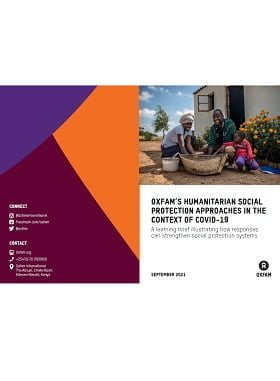
Oxfam’s humanitarian social protection approaches in the context of COVID-19
Report
A learning brief illustrating how responses can strengthen social protection systems
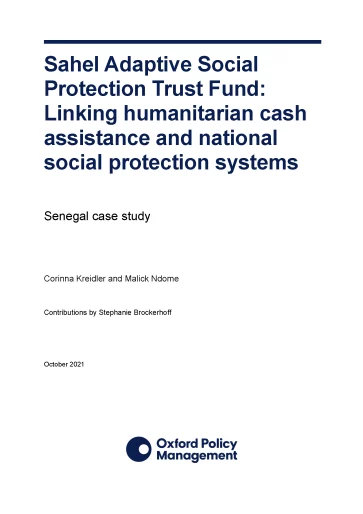
Sahel Adaptive Social Protection Trust Fund: Linking humanitarian cash assistance and national social protection systems – Senegal case study
Case Study
The Sahel Adaptive Social Protection Programme (SASPP) aims to help poor and vulnerable households become more resilient to the effects of climate change, and to expand the reach of shock-responsive cash transfer programmes in six Sahel countries: Burkina Faso, Chad, Mali, Mauritania, Niger, and Senegal....

Market-Based Approaches for National WASH Cluster Response Plans (in French)
Members event
This webinar is aimed for humanitarian practitioners working in Central African Republic, Mali, Burkina Faso, Burundi, Madagascar, Chad and Niger.

The CALP Network Technical Advisory Group (TAG) Quarterly Meeting
Event
This is the regular quarterly meeting for the CALP Network’s Technical Advisory Group.

Mapping Financial Service Providers for CVA: Read this before you start!
Blog Post
Sharing the secrets to a successful FSP mapping exercise in Yemen.
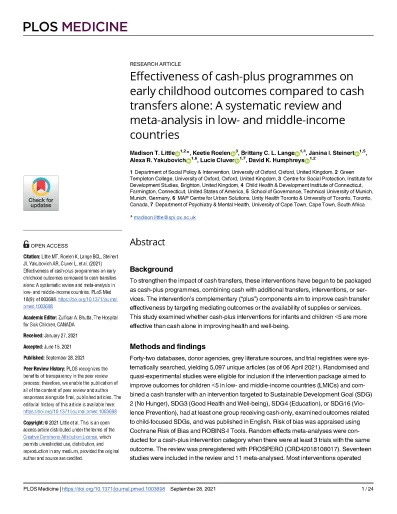
Effectiveness of Cash-plus Programmes on Early Childhood Outcomes Compared to Cash Transfers Alone: A systematic review and meta-analysis in low- and middle-income countries
Report
To strengthen the impact of cash transfers, these interventions have begun to be packaged as cash-plus programmes, combining cash with additional transfers, interventions, or services. The intervention’s complementary (“plus”) components aim to improve cash transfer effectiveness by targeting...

Launch of GSMA mobile money enabled cash aid delivery courses
Members event
These GSMA online courses, hosted by Digital Frontiers Institute, have been designed for participants to understand how mobile money enabled CVA works in practice, and what is needed to ensure effective operations work to the benefit of recipients, mobile money providers and aid implementers.

Armenia Cash Transfer Standard Operating Procedures to support Government-led cash based programmes
Report
The sub-working group on humanitarian cash transfer programming, within the UN Coordination Steering Group, gathers more than 20 organizations – comprising UN agencies, humanitarian NGOs and development partners. The group is working together to develop common and aligned approaches to cash-based...

Moving the dial on participation via CVA
Blog Post
In search of ideas to improve participation? Here are four positive approaches drawn from a variety of Cash and Voucher Assistance (CVA) programmes.

Estar en el extremo receptor: ¿Por qué los cupones carecen de dignidad y tienen un valor deficiente?
Blog Post
Innocent Tshilombo, quien pasó 10 años en el campo de refugiados de Kakuma en Kenia, describe cómo la imposición de condiciones a las transferencias monetarias puede afectar seriamente su eficacia.
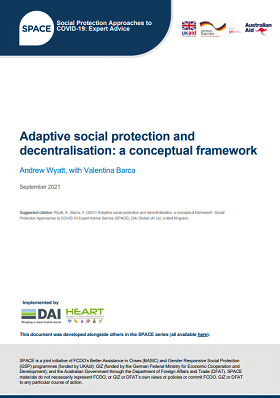
SPACE Adaptive social protection and decentralisation: a conceptual framework
Guidelines and Tools
The purpose of this paper is to provide an entry point for discussion of -and practical engagement with- the potential for linking the Adaptive Social Protection and Decentralisation agendas, in the first instance by technicians and practitioners within the German Development Cooperation. The need to...

Cash Hub Webinar 23: Protection Gender and Inclusion and CVA
Members event
Considering Protection, Gender and Inclusion when delivering Cash and Voucher Assistance (CVA) is essential to supporting the most vulnerable in an appropriate way and avoiding harm. Zambia Red Cross and Zimbabwe Red Cross will share activities and learning in relation to PGI and their CVA responses, and...